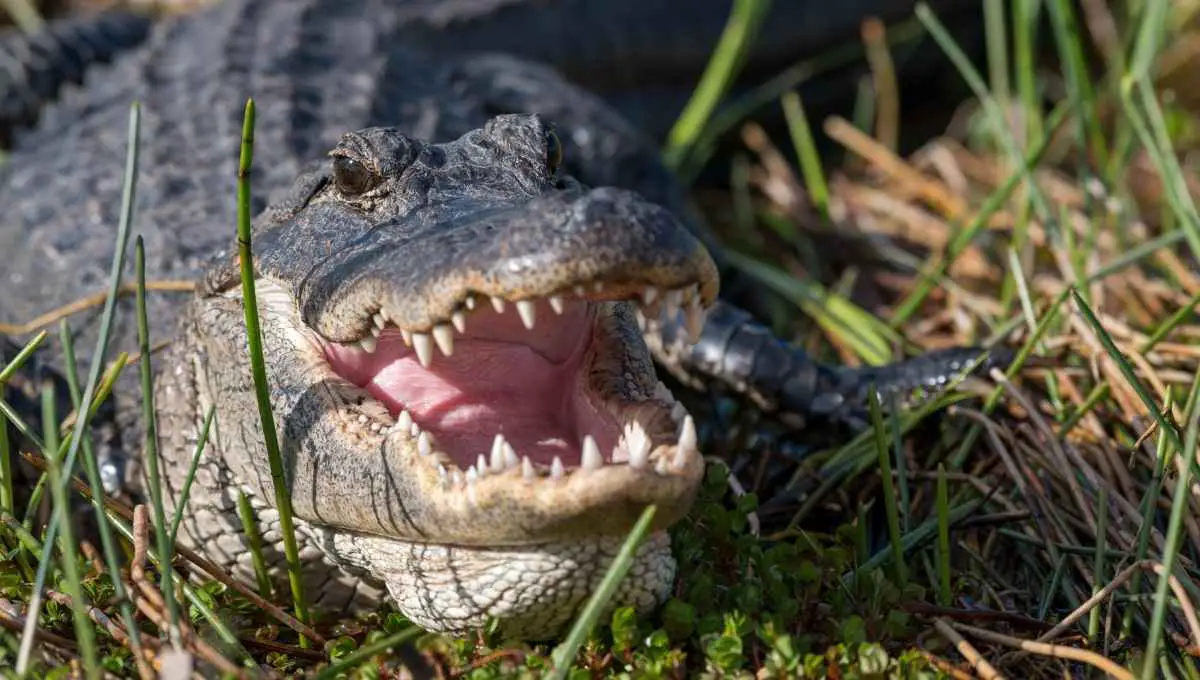Can I Shoot an Alligator on My Property? (Is This Illegal?)

If you live in the southern states, you’ve probably encountered an alligator or two. No one wants to go near these intimidating reptiles, so what do you do when a gator wanders onto your property? Can you shoot an alligator on your property?
It is illegal to shoot an alligator on your property unless you can prove that it was done in self-defense. Offenders could face a hefty fine of up to $5,000 or more and even prison time. If you see an alligator in your yard, call your state wildlife hotline or 911 to relocate the alligator.
The authorities are quite strict with these laws since they want to preserve the natural freshwater ecosystem. In this article, we’re going to look at why it is illegal and what you can do if you find an alligator on your property.
This post contains affiliate links from Amazon and other stores. This means Yard Blogger may earn a commission if you make a purchase using any of our links. Please refer to our full affiliate disclosure policy for full details.
Here’s a Quick Pro Tip!
No one wants a visit from a four-foot reptile, so there are a few ways to prevent an alligator from trespassing on your property. Currently, there are no registered alligator repellents, but there are other methods to keep them out.
The best products to keep alligators off your property.
1. Electric Fence Netting – Pre-assembled and designed to protect your yard. Pair with an electric fence charger.
2. Zareba Electric Fence Charger – Designed to keep alligators out.
3. Gallagher Electric Fence Energizer – Solar-powered energizer.
Killing Alligators
Despite their intimidating appearance, alligators are very docile. If you leave them alone, they’ll leave you alone.
Sometimes they might wander too close for comfort, so in this section, we’re going to discuss the details of what you can do.
Can You Shoot and Kill an Alligator in Your Yard?
The laws are different in each state, but in all the states, it is illegal to kill an alligator that is in your yard. You should call your state wildlife hotline, and they will dispatch a professional to remove the alligator.
In some states (Georgia, Texas, Louisiana, Alabama, Arkansas, etc.), you need to obtain a license or permit to hunt alligators.
However, in other states, such as Florida, you can only kill an alligator if it is deemed a nuisance by the Florida Fish and Wildlife Conservation Commission.
Can You Shoot And Kill An Alligator In Florida?
It is illegal to shoot an alligator in Florida except in self-defense or if the alligator is posing a threat to humans, pets, or livestock. To kill an alligator for its meat or hide, you must get a permit from the Florida Fish and Wildlife Conservation Commission.
Alligator hunting season is also limited to a few months out of the year.
The official Flordia senate website has a detailed document outlining the statutes regarding this.
If you want to remove an alligator from your property, you need to call the Florida Fish and Wildlife Conservation Commission. You can also hire a nuisance alligator trapper licensed by the Commission.
The Consequences Of Killing An Alligator In Florida
If caught killing an alligator, you could be fined up to $5,000 or face jail time. You might also have your hunting license suspended.
The best thing to do is to call the authorities and let them deal with the alligator.
Alligators are a vital part of the ecosystem, so protecting them is important.
What Happens If You Shoot An Alligator In Florida?
If you shoot an alligator in Florida, you could be fined up to $5,000 or face up to five years in prison. These penalties are much more severe if the alligator is on the endangered species list.
It’s important to note that it is also illegal to feed alligators. If you’re caught feeding alligators, you could be fined up to $500.
Can You Shoot and Kill an Alligator in Self-Defense?
It is illegal to shoot and kill an alligator, even in self-defense. Alligators are not likely to attack humans since they only pray on animals that are physically smaller than them. You might not face jail time but probably will get a hefty fine.
Although, the law does state that you are allowed to kill a nuisance gator. A nuisance alligator is an alligator that kills livestock or pets and poses a threat to human safety.
It’s a lot more difficult to claim ‘self-defense’ if you kill or injure an alligator off your property.
In 2012, two fishermen shot an alligator in self-defense while fishing in Texas.
However, after an investigation, it was not ruled as self-defense, and they were issued a $5300 fine, and no jail time, for illegal hunting.
You might also enjoy our post on If You Can Shoot Rats on Your Property
Can You Kill an Alligator With a 9MM?
A 9MM gun would most likely not be very helpful when using it in defense against an alligator unless you had a very clear close-range headshot (which is highly improbable). Nonetheless, it is illegal to shoot and kill an alligator, unless in self-defense.
The most effective defense you could take against alligators is distance. Keep your distance from alligators, and they will keep their distance from you.
Alligators have a natural fear of humans, but you should never approach them.
Can I Kill an Alligator on My Property?
It’s illegal to kill an alligator, even if it is on your property. You should contact your state wildlife hotline or even 911 to dispatch a professional. Alligators rarely hunt humans, so it’s more likely that the alligator is lost and has wandered onto your property.
However, you should not try to guide the alligator out of your house or try to scare it away. They do not naturally hunt humans, but they are capable of doing so if they feel threatened.
You should barricade yourself in a room and wait for the professionals.
Laws Protecting Gators
Alligators were hunted unrestricted during the first half of the 20th century. This caused a drastic depletion in their population, and it has only recently begun looking normal again.
There are currently a lot of laws in place to protect alligators. Let’s look at some of them!
Is It Illegal to Kill Alligators?
Currently, it is illegal across the United States to hunt or kill wild alligators. In some states, they do offer permits for hunting alligators. However, in others, it is not allowed. Contact your state wildlife conservation organization to find out more.
In 1967, alligators were listed as endangered due to the uncontrolled hunting and killing of these reptiles.
However, the species made a remarkable recovery and was removed from the list in 1987. The laws still remain around illegal hunting and killing of American alligators.
What Is the Penalty for Killing an Alligator?
Each state has different laws. In most states, you would be given a few years in prison and/or a hefty fine. It’s not something that officials take lightly, especially in states where alligators are thriving.
In Louisiana, you could face a $5000 fine (along with jail time), and in Florida, it is considered a third-degree felony to kill or injure an alligator.
If you can prove that the alligator was a nuisance gator, you could claim self-defense when killing the gator.
To prove this, we recommend taking a video if it’s nuisance behavior. This could later be used as evidence to support your self-defense claim and could get you off the hook.
Killing should be your last resort, not your first.
You might also enjoy our post on If You Can Shoot a Fox on Your Property
Are Alligators Protected?
American alligators are protected by law against illegal hunting and killing. In states where the population has recovered completely, there are hunting permits available. Hunting alligators is not very popular, though.
The alligator is federally protected by the Endangered Species Act. This is due to their similar appearance to the American crocodile.
Crocodiles are known to be more aggressive towards humans, and it’s not easy to tell the two apart.
Most noticeably, a crocodile is larger and has a V-shaped snout. An alligator is smaller and has a U-shaped snout.
Crocodiles are less common in the US and are only found in the south of Florida, whereas alligators are found in many southern states.
Is Alligator Hunting Legal?
In some states, such as Texas and Louisiana, you need to obtain a permit to hunt alligators, but in others, such as Florida, it is completely illegal. You should check with local authorities.
In states where the alligator population has completely recovered, controlled hunting is allowed via permits. Each state has different hunting laws.
You would need to have a permit and alligator harvest tags which you get before the season.
Why Can’t You Kill an Alligator?
Alligators are an important part of the freshwater ecosystem in America. Their numbers were depleted in the 20th century due to uncontrolled hunting. Laws against killing alligators are in place to protect the animals and the ecosystem.
Alligator numbers depleted drastically in the first half of the 1900s due to a lack of hunting regulations.
So, today it is illegal to kill or injure an alligator in all states, but in some, you can obtain a hunting permit.
Alligators in Your Yard
Alligators have the same laws protecting them on and off your yard. There are very rare instances that can be seen as self-defense, but let’s look at what you should do if you get a visit from a gator.
What to Do if an Alligator Is in Your Yard?
If you see an alligator in your yard, give it space. Do not attempt to move it or lure it away. Get to a safe spot in your house where you can see the gator out the window. Call 911 and request professionals to relocate the gator.
Alligators only wander into a backyard if something attracts them. This can be leftover food, garbage, or even a pool.
You should never leave food or any raw meat in your backyard. This will almost certainly attract gators.
You might also enjoy our post on If You Can Shoot a Snake in Your Yard
Do Alligators Roam at Night?
Alligators are nocturnal and diurnal, meaning they can be active any time of day or night. They are known to be more active between dawn and dust but do not forget about alligators during daytime.
You’ll often see them basking in the sun during the warmer months. During colder winter months, they are more dormant and mostly stay in their dens.
They dig up to 65 feet-long tunnels in water to act as their home and shelter against the weather.
What to Do if There Is an Alligator in Your Yard?
If you see an alligator in your yard, do not approach it. Retreat to a safe distance and contact the authorities to have someone safely remove the gator. Gators rarely attack humans, but they are capable of attacking if they feel threatened.
You should install a strong fence around your property if you live in an area with a dense alligator population. This is especially the case if you have small children, pets, or a pool.
All of these could attract a gator to your yard. A concrete wall, chain-link fence, or a privacy screen are good options.
Can I Kill an Alligator in My Yard?
It is illegal to kill an alligator, no matter where you encounter one. Your first reaction should be to retreat slowly to a safe spot and contact the authorities. There are certain rare occasions that you could plead self-defense.
Authorities are very strict concerning illegal alligator killing. So if you were to kill a gator and claim self-defense, you would need some evidence.
This could be security camera footage or anything similar to indicate that your life or your family’s lives were in danger.
The “What If” Game
Now that we have discussed all the laws and regulations around alligators let’s look at some less than likely what-if scenarios.
It’s good to know what you would do in situations like these, even though they are quite rare.
Can You Kill a Gator if It Attacks Your Dog?
In Florida, for example, you can claim self-defense if a gator tries to attack your pet. However, it is very difficult to argue this point if the attack happens off your property. Keep in mind that every state has different laws.
When walking your dog in an area that you know to have alligators, you should have your dog on a leash at all times and try to keep them away from the water.
A small dog is the perfect size of prey for an alligator.
What Happens if You Hit an Alligator With Your Car?
If you hit an alligator with your car, do not get out of the car. Stay inside and call the authorities to dispatch professionals. If you see an alligator attempting to cross the road, slow down or stop completely and keep your car a safe distance from the gator.
If you live close to an alligator den or habitat, you should stop about 12 feet before climbing into your car and check underneath.
If you see an alligator under your car, slowly retreat to your house and call the authorities.
Can You Fight an Alligator on Land?
If you are in the unlikely situation of an alligator attack, you should fight back. Kicking, slapping, punching, screaming, whatever you need to do to make a big scene. This might scare the alligator into releasing you.
Alligators have extremely strong jaws. If one does get a hold of you, don’t try to force open the jaw, but rather smack their snout or jab a finger in their eye.
These are two extremely sensitive areas of a gator that should get you out of its grip. Once you are free, run as fast as you can.
Can You Kill an Alligator With Your Bare Hands?
With the slim chance of an alligator attacking you, your chances are even slimmer, killing it with your bare hands. Alligators have extremely tough skin, powerful jaws, and very few ‘weak points’ on their bodies.
By jabbing at its eyes and snout, you might get the alligator to release you, and you could flee. Never try to fight an alligator if you can run away.
They can run fast, but only for a short amount of time. If you have enough headway, the gator will give up and retreat.
What Do You Do if an Alligator Chases You?
Run away in a straight line as fast as you can. Alligators typically only chase humans when they are defending their territory or a nest nearby. Once you are out of their territory, the gator will retreat.
Some people believe running in a zigzag motion might confuse a gator chasing you, but this is not true. Alligators are quite fast, but they don’t have a lot of stamina.
So, running in a straight line until the gator turns back should be the best course of action. When the gator turns back, this means it does not feel threatened anymore.
You might also enjoy our post on If You Can Shoot Birds in Your Backyard
Related Questions
Can a Human Outrun a Gator?
Alligators can run at almost double the speed of the average human, but they tire quickly. If you are about 50 yards away, you might be able to outrun a gator based on stamina, although the further you stay clear of them, the better.
An alligator can run up to 35 mph on land (according to Texas Parks and Wildlife), and the average human might run up to 12mph when they’re running for their life.
A gator only chases a human when it feels threatened, so as soon as you are out of their territory, they will back off.
Can Alligators Climb Fences?
Alligators can climb chain link fences up to about five feet. They won’t often do this, but if they feel threatened or trapped, they’ll easily climb a fence. So when installing a fence, make sure it is at least 5 feet high.
You could replace the chain link fence with wooden or concrete walls. Alligators are not able to climb walls due to their sheer weight.
However, a concrete wall might obstruct your view, so you could look at a safe glass wall if you don’t mind the added maintenance of cleaning your wall.
Are Alligators Fast on Land?
American alligators can run up to 35 mph. That’s faster than Usain Bolt’s record of 27 mph! Luckily, they don’t like running any more than we do. Alligators will tire quickly and only run when they feel threatened.
In the water, it’s a different story. Alligators can swim up to 20 mph, and they have a lot more stamina. In comparison, Michael Phelps can swim 6 mph.
You should never allow your children or pets to swim in a lake/river that is a known alligator habitat.
Final Thoughts
It is illegal to shoot an alligator on or off your property. There are rare circumstances where you could claim self-defense but don’t put your hopes on it.
Alligators are not aggressive animals, but you should always keep your distance and contact the authorities.












